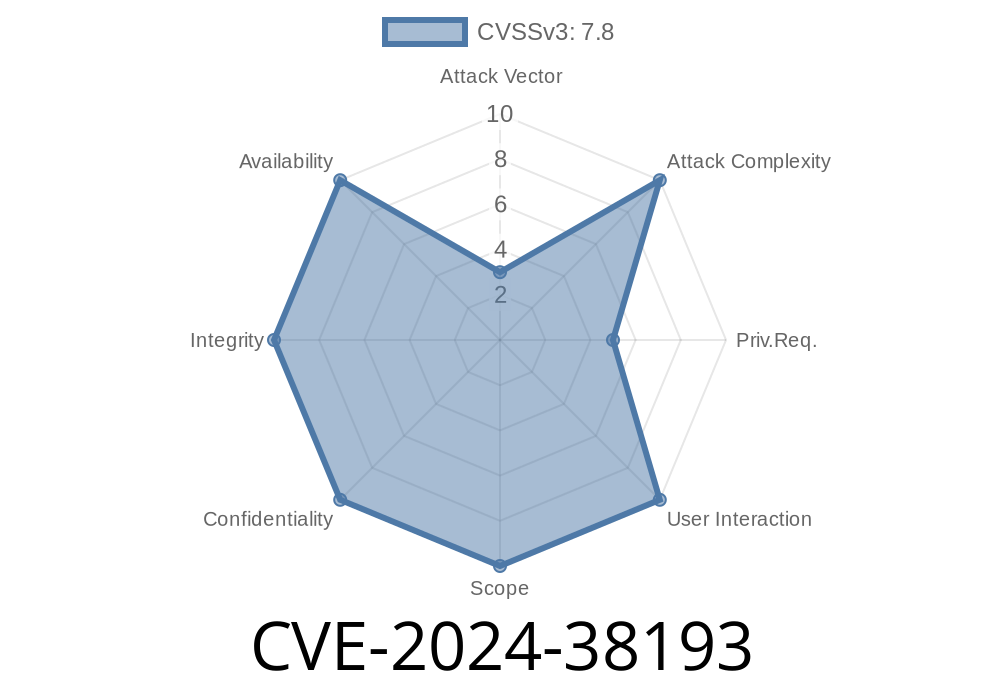In June 2024, Microsoft released a patch for a critical vulnerability: CVE-2024-38193. This bug affects the Windows Ancillary Function Driver for WinSock (afd.sys) and allows attackers to perform an Elevation of Privilege (EoP) attack. Below, we’ll break down what that really means, how it’s exploited, show a simple code snippet, and what you need to do to stay safe.
What’s the Ancillary Function Driver for WinSock?
The afd.sys driver acts as a communication bridge for Windows networking, helping manage sockets, protocols, and connections for applications. This driver runs with SYSTEM-level privileges, which can be a goldmine for attackers if vulnerabilities are present.
What’s CVE-2024-38193 All About?
According to Microsoft’s Security Update Guide, this vulnerability lets a local attacker run code as SYSTEM—essentially full control over a Windows computer. It doesn’t require user interaction, nor does it need admin rights to start with.
How Does the Exploit Work?
An attacker who can execute code locally—such as through a compromised low-privilege account—could exploit afd.sys to run arbitrary code as SYSTEM. This is typically done by sending specially crafted requests to the afd.sys driver, causing it to mismanage memory or process permissions incorrectly.
Core Problem
The vulnerability is a race condition and/or improper input validation in how afd.sys handles socket calls, particularly IOCTLs (input/output control codes). By abusing this, attackers can overwrite certain fields in kernel memory, resulting in privilege escalation.
Code Snippet: Exploit Demonstration
Below is a simplified proof-of-concept (PoC) showcasing how an attacker might trigger the vulnerability. The *real* exploit involves complex manipulation, but here’s a (non-malicious) structure for educational purposes only:
#include <windows.h>
#include <stdio.h>
#define AFD_DEVICE "\\\\.\\AFD"
#define IOCTL_CODE x0001207F // Example IOCTL for AFD
int main() {
HANDLE hDevice = CreateFileA(
AFD_DEVICE,
GENERIC_READ | GENERIC_WRITE,
, NULL, OPEN_EXISTING, , NULL);
if (hDevice == INVALID_HANDLE_VALUE) {
printf("Failed to open afd.sys device. Error: %lu\n", GetLastError());
return 1;
}
DWORD bytesReturned;
char inputBuffer[1024] = {};
// Craft inputBuffer in a way that could trigger the vulnerability
// This is a placeholder; real exploit details are more complex
if (DeviceIoControl(
hDevice, IOCTL_CODE,
inputBuffer, sizeof(inputBuffer),
NULL, , &bytesReturned, NULL))
{
printf("IOCTL sent successfully. System may be vulnerable!\n");
} else {
printf("IOCTL failed. Error: %lu\n", GetLastError());
}
CloseHandle(hDevice);
return ;
}
Disclaimer: This example does not exploit the vulnerability, but shows the entry point an attacker would use.
References & Further Reading
- Microsoft Advisory for CVE-2024-38193
- AFD.sys Windows Internals Documentation
- Project Zero: Windows Kernel Exploitation Trends
Closing Thoughts
CVE-2024-38193 is yet another example of how complex and sensitive low-level Windows drivers can be. Because afd.sys runs with such high privileges, even a small bug becomes a big risk. If you haven’t patched your systems—do it now. Attackers won’t wait.
Stay safe, and monitor the usual trusted security bulletins for updates as more details become public.
Timeline
Published on: 08/13/2024 18:15:28 UTC
Last modified on: 08/16/2024 19:12:02 UTC
